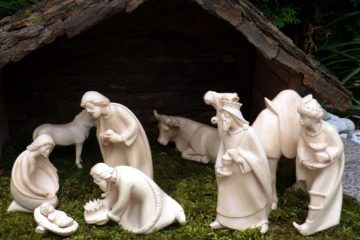Faith=Trust?
Over the years, I have encountered many people who claim faith in God. My parents raised me in a culture of faith, going to church every Sunday, modelling consistent service. I knew the  stories and could navigate the Bible fast enough to find the winning verse for the chocolate bar the Sunday School teacher offered. I believed all of it without question. Many of those with whom I rubbed shoulders were the same. We didn’t talk about the hard things of faith because what was there to question? We loved God, believed the Bible and thought we would for the rest of our days.
stories and could navigate the Bible fast enough to find the winning verse for the chocolate bar the Sunday School teacher offered. I believed all of it without question. Many of those with whom I rubbed shoulders were the same. We didn’t talk about the hard things of faith because what was there to question? We loved God, believed the Bible and thought we would for the rest of our days.
As I think on this now, I see the lack of substance in my walk with God. Did I have faith? Absolutely! To this day, I believe in God’s existence, Creation and His perfect redemption of humanity through Jesus. But do I trust God? That is another question altogether.
Definitions
Faith:
- Complete confidence in someone or something
- Strong belief in the doctrines of a religion, based on spiritual conviction rather than proof
Trust:
- to have confidence in something, or to believe in someone
- to hope and expect that something is true
Gotquestions.org defines the relationship between faith and trust like this”
“…the Bible contains a clear definition of faith in Hebrews 11:1: “Now faith is the assurance of things hoped for, the conviction of things not seen.” Simply put, the biblical definition of faith is “trusting in something you cannot explicitly prove.” This definition of faith contains two aspects: intellectual assent and trust. Intellectual assent is believing something to be true. Trust is actually relying on the fact that the something is true. A chair is often used to help illustrate this. Intellectual assent is recognizing that a chair is a chair and agreeing that it is designed to support a person who sits on it. Trust is actually sitting in the chair.”
One and the same?
There can be a beautiful relationship between faith and trust, but we cannot assume it. Faith is a matter of the heart, a decision made from hope rather than proven fact. It is a belief system and for our purposes here, we are talking about belief in the triune God. We cannot see Him, hear Him or touch Him in a physical sense. We believe He has always existed and is sovereignly caring for our every need.
Trust, on the other hand, is based on evidence that is real according to our senses and reason, a matter of the mind. At some point, we each decide whether we will trust depending on our knowledge, instinct and experience. For this reason, I argue that when faith exists, trust isn’t a given. I may believe in God but the meaning I make of my experiences may tell me that God is not trustworthy. Make sense?
In order to trust God, our definition suggests we need proof or evidence that supports such an action. If belief is not enough, then where do we go from here? The Bible is the primary place where we find solid reason to put our life in God’s hands. Let me suggest three aspects which may help the case for trust in God.
Proof: He is Perfect in Character
- Aseity – This means that God exists in and of Himself, with no beginning or end. He is the Source, the Creator who is self-sufficient and completely autonomous. Acts 17:24-25 explains “The God who made the world and all things in it, since He is Lord of heaven and earth, does not dwell in temples made with hands; nor is He served by human hands, as though He needed anything, since He Himself gives to all people life and breath and all things”

- Sovereignty – God is all-present, all-powerful, all-knowing. No one can thwart or resist God; He will see His plans through. “Yours, O Lord, is the greatness and the power and the glory and the victory and the majesty, for all that is in the heavens and in the earth is Yours. Yours is the kingdom, O Lord, and You are exalted as head above all. Both riches and honour come from You, and You rule over all. In Your hand are power and might, and in Your hand it is to make great and to give strength to all.” (2 Chron. 29:11-12)
- Love – God is love. Period. Whether we see it, know it or believe it, this is what Scripture says: “Anyone who does not love does not know God, because God is love.” (1 John 4:8) “But God, being rich in mercy, because of the great love with which he loved us, even when we were dead in our trespasses, made us alive together with Christ—by grace you have been saved” (Eph 2:4-5) “We love because he first loved us.” (1 John 4:19)
- Holiness – Father, Son and Holy Spirit together make up the holy trinity that is God. He is pure and without sin. “There is none like Him. Who will not fear, O Lord, and glorify your name? For you alone are holy. All nations will come and worship you, for your righteous acts have been revealed.” (Rev. 15:4) “So I will show my greatness and my holiness and make myself known in the eyes of many nations. Then they will know that I am the Lord.” (Ez. 38:23)
- Wisdom – Believing in God’s sovereignty makes way for the acceptance of God’s wisdom. “‘For my thoughts are not your thoughts, neither are your ways my ways,’ declares the Lord. ‘As the heavens are higher than the earth, so are my ways higher than your ways and my thoughts than your thoughts.” (Is. 55:8-9) As we grasp that concept, the care in His wisdom might make more sense. “But the wisdom from above is first pure, then peaceable, gentle, open to reason, full of mercy and good fruits, impartial and sincere.” (James 3:17)
Proof: He is Perfect in His Promises
I can hardly recount the promises of God in a short blog post! But a quick glance at scripture shows us what we can be sure of. I challenge you to do your own study on this topic to enhance your trust in God.
- 1 John 1:9 “If we confess our sins, he is faithful and just to forgive us our sins and to cleanse us from all unrighteousness.”
- John 3:16 “For God so loved the world, that he gave his only Son, that whoever believes in him should not perish but have eternal life.”
- Matt. 28:20 “…surely I am with you always, to the very end of the age.”
- John 10:28-29 “I give them eternal life, and they shall never perish; no one will snatch them out of my hand. My Father, who has given them to me, is greater than all; no one can snatch them out of my Father’s hand.
- Matt. 6:31, 33 “So do not worry, saying, ‘What shall we eat?’ or ‘What shall we drink?’ or ‘What shall we wear?’ But seek first his kingdom and his righteousness, and all these things will be given to you as well.”
Proof: He is Perfect in His Action
Finally, we see God is perfect in how He carries out His plans. Before time began, He initiated a relationship with each of us. Ephesians 1:4 states “For He chose us in Him before the creation of the world to be holy and blameless in His sight.” As sin and brokenness entered the world, His plan of salvation began to unfold. Through the Israelite nation, we see the love and discipline of a holy God, committed to the refining of His people. When the time was right, He sent His Son, Jesus, to redeem not only the Jews, but all people, offering them freedom from their sinful state. “But when the set time had fully come, God sent his Son, born of a woman, born under the law, to redeem those under the law, that we might receive adoption to sonship.” (Gal. 4:4-5)
The New Testament of the Bible is a narrative of God’s plan carried out through Jesus coming to earth and the development of the Church. The Gospels chronicle the life and death of Jesus, highlighting His final years of ministry. In the book of Acts, we learn of Jesus’ journey to heaven, followed by the promised Holy Spirit. Through the presence of the Spirit in a believer’s life (Eph. 1:13-14), we are empowered and equipped for service. We see the expansion of the Church throughout Acts and how all peoples received the good news of Jesus. We are part of this crowd of believers as we await the second coming of Christ, explained in the prophetic writings of John in the book of Revelation.
That’s a lot of heady stuff!
Are you still with me? I realize that was a short but deep dive into some massive topics. I don’t pretend to think that I can adequately describe any of the proofs above, but I hope by scratching the surface, you can catch of glimpse of the magnitude of God’s perfection. It makes me stand back and wonder how I could ever lack in my trust of God. He is beyond words…incredible, magnificent, breath-taking, truly awesome…but I do struggle to trust God.
How can this be with such astounding evidence laid out? God created us with a will, the ability to choose for ourselves. If you are a parent, or have spent time with young children, you know what it is like for a child to push past your wisdom. You likely know and understand a situation and the consequences of certain actions. But the three-year-old thinks he does as well! He trusts himself to make the best choice, even though he is wildly ill-equipped to decide.
So it is with us and God. Sometimes we think we know best and have the power to make things happen that are completely out of our control. As we gain confidence in our own strength, stacking evidence that we are more than capable, we trust ourselves to make the right decision. We elevate our capacity and rely on best guesses, believing we know what is best for ourselves and others. In word, we might trust God, but in deed, we often don’t.
So what now?
As with so much in the human experience, self-awareness is key. For so many years, I would have arrogantly proclaimed that I trust God explicitly. My thinking was black and white, not to be questioned or argued with. Ugh…it doesn’t feel good to write those words, but it is in the admission and awareness where change can occur. I needed to face my own desire for control and work toward laying it down. Pride is a wicked task master! But the Lord makes it clear He cannot abide by arrogance and will not share His glory. (Prov. 16:5, Is. 42:8)
Do you trust God? Really and truly trust God? Or do you look to yourself, others or things to provide the comfort, security and healing you desire? Jeremiah speaks about this in chapter 17 of his book. He describes trust in ‘man’ as a wasteland, a parched place where no one can thrive. Are you blaming God for His lack of intervention in your circumstance? Are you taking matters into your own hands because His timeline is inadequate? Do you think you would do a better job if you were put in charge? Do you secretly think that His sovereignty is a bit of a scam? Why won’t He stop COVID or other atrocities happening in the world today? How can I trust God when He doesn’t assert His power in the ways that matter most?
Next steps
I cannot answer those questions for you, friend. They require deep wrestling with God and a searching of your innermost beliefs. But I affirm the struggle is real. We are stubborn and willful creatures, bent on doing things our own way. For myself, I need to tether myself to the truth listed above. The word of God is a secure anchor when I want to drift back into trusting myself. I need a reminder that I am nothing next to the greatness of God. He is the Creator. I am a speck of dust, in a moment of time. Where I can make a daily mess of my life, He is making all things good in His perfect timing. It might not make sense, but I am not entitled to know all the answers to my questions. That’s where trust comes in – the action side of faith.
If you desire help in the wrestling, I would love to walk with you as your coach. Perhaps therapy would be a better fit. Regardless, you don’t need to struggle on your own. God has new mercy every morning; you can start again.


